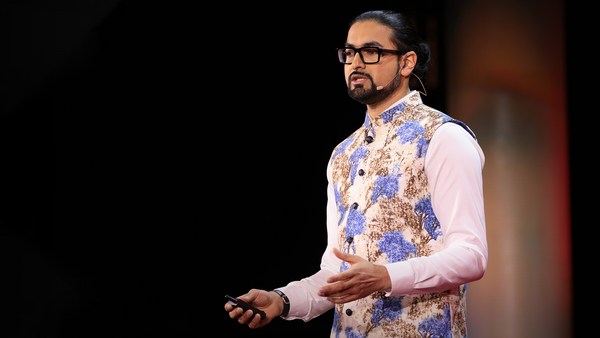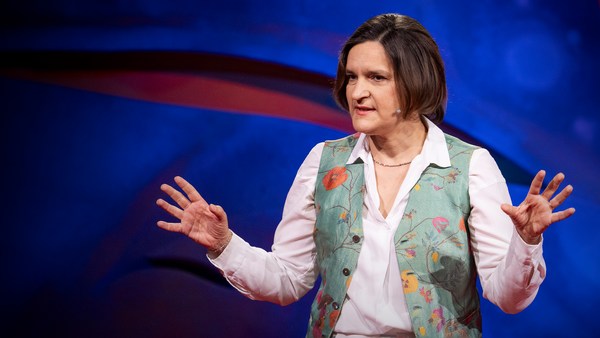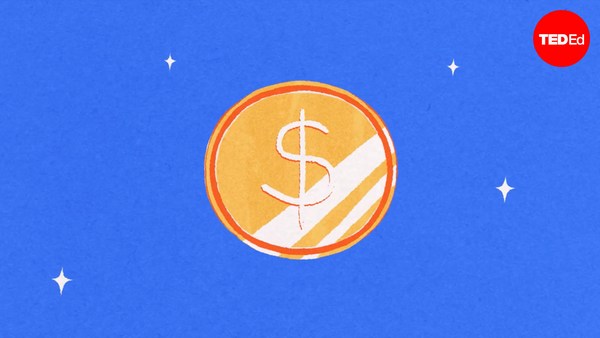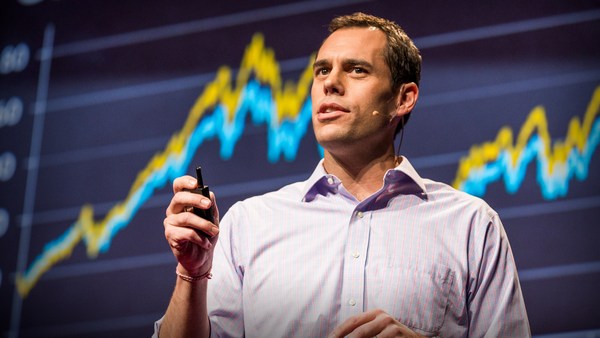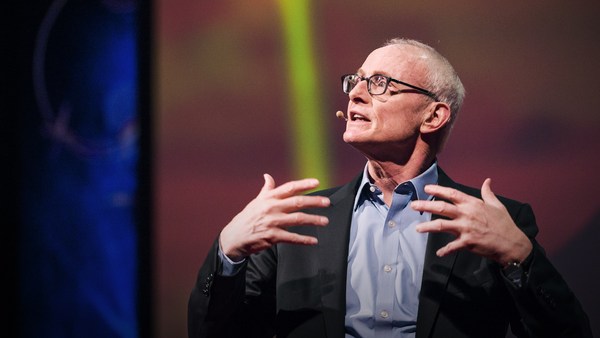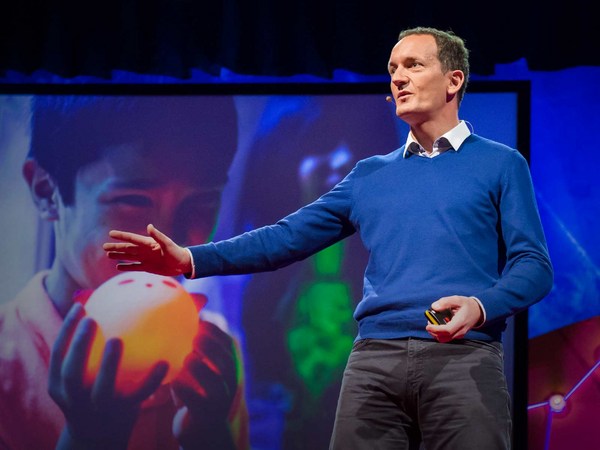How can capitalism help solve climate change? I'm Steve Howard, I'm vice chair of sustainability at global investment firm Temasek. I've been wrestling with this question for about three decades. Formerly I was chief sustainability officer at IKEA. I've helped set up several climate change organizations. We Mean Business Coalition, the Climate Group, and recently Tilt Collective. And I've come to conclusions that there are some real hard truths.
The first hard truth: every business is a machine. They are hardwired and softwired to do what they do. That's why they're really good at it.
Let me give you an example. About 15 years ago, I sat in the headquarters of a global car manufacturer with their chief technology officer. I said to him, "Surely the future is electric vehicles."
He slapped the table and said, "Never, while I am CTO, will we make an electric vehicle." Now he’s absolutely right, because he’s no longer CTO.
(Laughter)
(Applause)
Amazingly enough, I got a taxi the other day in one of that company's electric vehicles.
(Cheers)
But it's very easy to make that about him and his leadership. But I realized that day that in the buildings around us, there were hundreds of proud, skilled engineers who'd spent their careers making ever-better internal combustion engines. The company had spent 100 years perfecting global supply chains for spark plugs and carburetors. This was an internal combustion engine vehicle company, and change for companies like these is incredibly hard. And many companies, from manufacturing to technology and even finance, are hardwired and softwired to do what they do.
Now of course, there are exceptions, but they’re exactly that: they’re exceptions. And we’re sorely mistaken if we think all companies will change themselves by themselves.
My second truth is that financial markets are incredibly short term. The leader of a private bank said to me recently, "Steve, I've never met a long-term investor." A hedge fund leader said to me, "Steve, you have to remember we're profit-seeking creatures. I wake up in the morning and think, how much profit will I make today? I go to bed at night and think, how much profit did I make?"
So markets are baked in to pursue short-term profit over long-term value creation. The other thing is the free market has had a free ride. If you asked an economist in the room, they would talk about externalities. It's external to the market, but it's not external to people and the planet. These are the costs that are borne of the impacts on nature, of pollution, the destruction of our habitats, the impact on human health, and of course, the dramatically escalating costs of climate change. They're not priced into the market. The companies don't pay the bill. Now economists can debate the exact number, but we know they're in the trillions of dollars, the bills mostly unpaid, and it's rising by the day.
So how do we go from short term to long term? It's a difficult thing to do, but if you're a long-term investor, a large asset owner, a pension fund, a sovereign wealth fund, an endowment, a family office, then you're exposed to the total economy. The best guarantee of your long-term financial success is economic growth itself. And we know an inclusive, resilient economy where we tackle climate change is the one with the best economic growth. Again, the numbers have been run time and time again on the impacts of unabated climate change. Cambridge University did one recently. Their estimate was unabated climate change will wipe out a quarter of global GDP. That's five Covid pandemics, and it's a pandemic that doesn't go away. So if you're a long-term investor, if you're an asset allocator, a principal owner of capital, it's in your interests to invest in solving climate change, not just in the easy things to do, but in the hard things to do with conviction capital.
Now, at Temasek, we are a longer-term investor. We've just had our 50th anniversary. Our purpose is so that every generation prospers. We have stakes in some of the companies today that were the companies that we had when we started 50 years ago. But in order to align ourselves with climate change, we had to rewire ourselves. We had to measure carbon portfolio emissions, set carbon budgets, put an internal carbon price in, align our staff incentives with success, set those targets, engage all our portfolio companies. And then we had to realign our strategies, reskill our investment teams, invest in new partnerships and new platform companies so that we had the capabilities to invest in the sustainable businesses of today and tomorrow. Now our portfolio of sustainability-aligned investments is 40 billion SGD, up a lot from a few billion just a few years ago. It’s growing, and it’s a start. This is a journey we're on, but we're well on the way.
The third truth: policy is a master switch. If we want to level the playing field for climate technologies, we need long, loud, legal policies. This can unlock the investment and get innovators innovating. Long, if you have a technology that takes ten years to develop, there's no use having a policy that's just one-year long. You need it to last a full investment cycle. The policy must be loud. The signal must be unmissable. Legal means it must have teeth. Compliance can't be optional. Now, most businesses don't embrace policies, but they want clarity, they want a level playing field. And we know if we want a free market to be a fair market, policy is a master switch. And in this environment we can say, actually we need all the countries, we need large countries to have policy and not to roll them back. But actually whether you're a city, a state, a smaller country, policy can be hugely powerful.
Let's take the Singapore CO2 tax, the carbon tax in Singapore. That's provided a price signal. It's priced an externality by putting a price on carbon. It's allowed the businesses in Singapore, including many of our portfolio companies, to turn long-term targets into concrete actions and plans to decarbonize their business. They can create the business case because of that carbon price. It's also had a link to global carbon markets, and global carbon markets are going to be increasingly important over the next decade, because you can meet some of your obligation for the tax with international carbon credits. So it's allowed our own platform company, GenZero, to invest with greater confidence in projects that are removing and reducing emissions elsewhere. Nature-based solutions, forest restoration projects.
Policy can be a carrot as well as a stick. In Singapore, they went for super fast regulatory approval for plant-based proteins and cell-cultivated meats. If you're a startup, you measure time in days and weeks, not years. So being able to get to market quickly and meet your customers, test your products, and get revenue in is invaluable. Singapore has become a hub for these companies now.
But it's not just for startups that fast regulatory approval and good planning is a big boon. It's for big infrastructure projects as well. Why be tied up for years if you can have effective, fast planning. Then it gets green shovels in the ground and green investment flowing.
My fourth truth is just a word. It’s only one word, and it’s a really important one. Better. I learned this when I was in IKEA. And I'm going to give you an example. When I started in IKEA, we had some LED lights. They were expensive, sales were limited, and the light was still harsh and stark. But we knew because it was so much more energy-efficient and the technology was developing, we knew they were the future. So we set a target for ourselves to go for 100 percent LEDs across the business. We aligned all our investments with ever-better LEDs. We communicated across the supply chains, we used our own purchasing power to secure finance for new factories and production lines. When we got to the LED that was not just energy efficient but was affordable with a great quality of light, the next best thing to daylight, they flew off the shelves. And we hit our target of being able to only sell LEDs from 2015.
When you get to better, you get scale really fast. So if you look at the total global lighting sector, in 2010, it was less than one percent LEDs, more than 99 percent all the other types of light bulbs. By 2020, it was more than 60 percent. We flipped the entire global lighting sector that had been around for more than 100 years in a decade. When you get to better, you get to scale really fast. And we know that there are many other technologies that have got to better. They've moved from the green premium to the green discount. Solar. Wind. Batteries. Storage. It's very exciting. And when you get to better, these technologies create platforms for business model innovation. Our impact investing partner, Leapfrog, has invested in a startup in India. It's a young startup, they're doing battery swapping stations for two-wheeler drivers and auto rickshaw drivers. So rather than have a long queue to refuel, you can drive in, in two minutes your battery is swapped out, it's a fixed price, you can have a cup of chai, you drive away. It's cleaner, it's cheaper, it's quieter, it's mechanically more efficient. The customers love it. They've got 75,000 drivers on their platform and growing. They’re doing more than three million swaps a month.
Now we know that there are many other areas where in emerging markets, this business model innovation with these better technologies -- pay-as-you-go solar is a great example there -- but capital is scarce. We need capital allocators to allocate capital for emerging markets.
The other area where it's really hard to find finance is for those technologies that haven't achieved full commercial parity yet. The big industrial plants that are going for their first, second or third of a kind plants, sustainable aviation fuel, green hydrogen, green cement, green steel, those cell-cultivated meats and plant-based proteins. Now these industries, let's be clear, are the industries of the future. If you're an investor or a policymaker, you have to know they're the future and lean in behind them. And it will be cleaner, cheaper, better, faster, tastier future.
Let's take one example. We have invested at Temasek for a long time in large real estate businesses. They are big users of steel, cement and concrete. If you take cement in the form of concrete, it's the second most abundant material we use after water, 30 billion tons a year, eight percent of CO2. It’s hyper-commoditized, very slim margins, lots of sunk capital in cement factories around the world. It's hard to innovate, hard to transform. We've invested in a company that's got an end-of-pipe solution. Basically, it's a bolt-on technology that captures the CO2 that would otherwise cause climate change and pollute the atmosphere, it remineralizes it and incorporates it back in the cement so you get zero pollution and more cement. But you need patient capital behind these sort of companies. That company alone has taken 100,000 hours of R&D on the technology, and it's going to need a lot of capital to roll that out across the cement industry.
I have an ask. Yeah. If you’re a policymaker, let's go for long, loud, legal policy regimes. Let's make the free market a fair market. Let's price externalities. But this is going to unlock a green industrial revolution in your economy. It's going to create the green jobs of the future. It's going to future-proof your economies. If you're an asset allocator or you influence one, if you're in a pension fund, if you're in an endowment, a family office, a sovereign wealth fund elsewhere where you're allocating capital, take a pot of patient long-term capital and put it behind climate change -- not just for the easy things to do, but for the hard things to do. It's in your interest to do it, and you'll be backing the industries of the future. I know many of the people in that sector, and I am talking to you. Remember the ask.
If you're an individual, then actually maybe you have a pension or some savings. Look at your provider. Ask them what their climate allocation is. If they don't have a great answer, move it somewhere else. If you're a business leader or an entrepreneur, embrace change, unlock opportunity and go for better.
Now this won't be easy, but we've used this playbook before. Good government policy and incentives. Business innovation and investment. We've ended acid rain, we've closed the ozone hole, we've harnessed the power of the sun and the wind to create the cheapest form of energy on the planet. And we have five billion years of sun reserves. We've also lit a billion homes with LEDs. And we have to remember, humanity wrote the rulebook. We've created all the markets. We've allowed externalities. We write all the policies. We've built all the machines. But if we rewire capitalism, we can help solve climate change.
Thank you.
(Applause)
